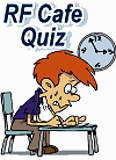 All RF Cafe Quizzes make great fodder for
employment interviews for technicians or engineers - particularly those who are
fresh out of school or are relatively new to the work world. Come to think of it,
they would make equally excellent study material for the same persons who are going
to be interviewed for a job. Bonne chance, Viel Glück, がんばろう,
buena suerte, удачи, in bocca al lupo, 행운을 빕니다,
ádh mór, בהצלחה, lykke til, 祝你好運.
Well, you know what I mean: Good luck! All RF Cafe Quizzes make great fodder for
employment interviews for technicians or engineers - particularly those who are
fresh out of school or are relatively new to the work world. Come to think of it,
they would make equally excellent study material for the same persons who are going
to be interviewed for a job. Bonne chance, Viel Glück, がんばろう,
buena suerte, удачи, in bocca al lupo, 행운을 빕니다,
ádh mór, בהצלחה, lykke til, 祝你好運.
Well, you know what I mean: Good luck!
Click here for the complete list of
RF Cafe Quizzes.
Note: Some material based on books have quoted passages.
Return to RF
Cafe Quiz #27
 This
quiz is based on the information presented in Remarkable Engineers, from Riquet to Shannon, by Ioan James.
Published by Cambridge University Press. This
quiz is based on the information presented in Remarkable Engineers, from Riquet to Shannon, by Ioan James.
Published by Cambridge University Press. Note: Some of these books are
available as prizes in the monthly RF Cafe
Giveaway.
1. Why is the subtitle "From Riquet to Shannon? b) Riquet is the earliest
engineer covered, and Shannon is the latest Riquet lived from 1604 to 1680. Shannon lived from 1916 to
2001. See pages v through vii.
 2.
Who first suggested that water was composed of hydrogen and oxygen? 2.
Who first suggested that water was composed of hydrogen and oxygen? d) James Watt "...in 1783 he
suggested in a paper submitted to the Royal Society that water was not a simple substance but a compound of
hydrogen and oxygen." See page 14.
 3.
What was the main motivation for Charles Babbage to develop his Difference Engine? 3.
What was the main motivation for Charles Babbage to develop his Difference Engine? b) To eliminate the
errors in existing numerical tables of logarithms, etc. "...he resolved to make what he called the
Difference Engine, which would do the tedious work without human intervention, printing out the result
automatically. It was well known that the were a huge number of errors in virtually all sets of tables then in
use." See page 46.
 4.
Sir William Thomson, 1st Baron Kelvin (or Lord Kelvin), is well-know for proposing 4.
Sir William Thomson, 1st Baron Kelvin (or Lord Kelvin), is well-know for proposing the concept of
absolute zero. For what else is he famous? c) A magnetic compass "One of [Kelvin's] most successful
inventions was the patent magnetic compass of which no fewer that 10,000 were sold; this eventually superseded the
older type, which was unreliable in iron-clad ships." See page 85.
 5.
Westinghouse is a giant in the nuclear power and household appliance industries, 5.
Westinghouse is a giant in the nuclear power and household appliance industries, and was so formerly in
defense electronics (I worked for their Oceanic division in Annapolis, MD, in the 1980s). What was George
Westinghouse's first major successful product? a) Compressed air brakes for trains "...he
[Westinghouse] patented his first major invention, a compress air braking system, which allowed all the individual
brakes on trains and other vehicles to be applied at the same time." See page 91.
 6.
Who confirmed the existence of electromagnetic radiation? 6.
Who confirmed the existence of electromagnetic radiation? d) Heinrich Hertz "He settled the problem
proposed for the Berlin Academy prize by confirming the existence of the electromagnetic radiation predicted by
Maxwell..." See page 124.
 7.
What was Elmer Sperry's most notable invention? 7.
What was Elmer Sperry's most notable invention? a) The navigational gyroscope "...Sperry's name is
remembered chiefly for the practical development of the gyroscope..." See page 132.
 8.
Who made the first transatlantic radio transmission? 8.
Who made the first transatlantic radio transmission? b) Guglielmo Marconi "...Marconi made history
when the first transatlantic signals were sent in December 1901 from Poldhu on the coast of south-west Cornwall to
St. John's, the chief city of Newfoundland, where they were received from an aerial suspended by a kite." See page
142.
 9.
What is Edith Clarke's claim to fame? 9.
What is Edith Clarke's claim to fame? d) All of the above See page 151.
 10.
Aside from co-inventing the first transistor, for what else was William Shockley well-known? 10.
Aside from co-inventing the first transistor, for what else was William Shockley well-known? a)
Practical jokes "...he was also an accomplished amateur magician, and became famous for elaborate
practical jokes." See page 174. |









 2.
Who first suggested that water was composed of hydrogen and oxygen?
2.
Who first suggested that water was composed of hydrogen and oxygen?




 8.
Who made the first transatlantic radio transmission?
8.
Who made the first transatlantic radio transmission?

